Tropico 4 – PC Game Review
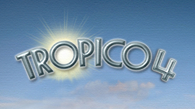 Tropico 4. PC Game Review. Publisher: Kalypso Media. Developer: Haemimont Games. $39.99
Tropico 4. PC Game Review. Publisher: Kalypso Media. Developer: Haemimont Games. $39.99
Passed Inspection: Fun in the sun. Light-hearted atmosphere belies the hard business of running a small island nation. Players can be as democratic or despotic as they like. Ample humor pokes fun at virtually every political faction.
Failed Basic: Music is great, but there needs to be more. Fans of Tropico 3 may have a hard time figuring out whether Tropico 4 is an expansion or a true sequel.
{default}Tropico is becoming one of the all-time greatest game franchises. I have played every game since the original, and with the exception of Tropico 2 (Run away!) the series has done nothing but improve. Originally created by PopTop Software and released a decade ago, Tropico transported gamers to a Central American-esque island where the player was tasked with developing the island’s economy while balancing numerous political factions.
Part economic sim, part city-building sim, and all fun, two years ago Bulgarian game developer Haemimont Games secured the rights to work on the game, and Tropico 3 was launched to critical and popular acclaim. More of a resurrection of the franchise than a sequel, Tropico 3 replicated the successful formula of the original game and established Haemimont’s reputation as a AAA game developer.
The basic gameplay for the Tropico series has been largely unchanged in each version. The player is given control of a tropical island and wins the game by deftly managing the economic and political needs of its people. Starting in the 1950s during the height of the Cold War, the primary focus of the game is on domestic issues, but a failure to keep modestly warm relations with both superpowers can result in dire consequences. Players have a limited budget with which to buy buildings and other structures on their island. These buildings and structures may meet the needs of the locals, such as a hospital or marketplace, or they may produce goods for exports, such a cigar factory, distillery, and mine. If players successfully develop their economy they will make more money and can buy additional buildings such as a furniture factory that processes raw lumber into more valuable goods. These can then be exported to make money.
In addition to the economic challenges of building a successful economy, players must also balance the political needs of the island’s inhabitants. Just as in real life, numerous political factions exist, many with conflicting agendas. Environmentalists will grow unhappy if factories produce too much pollution. Capitalists will grow unhappy if players don’t export enough goods to maintain a healthy economy. Communists will protest if the quality of health care or housing is sub-standard. Pious citizens need churches to be built to fulfill their spiritual needs.
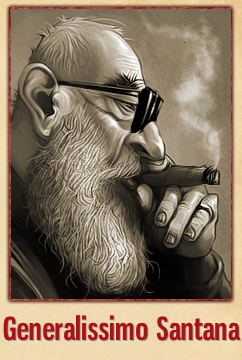
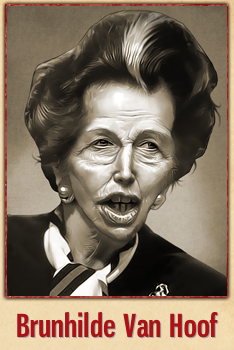
Everyone gets poked fun at.
If these political issues seem so weighty as to be too close to home for comfort, the potential drama is offset by humor, parody, and caricature. No group is spared – the land of Tropico is an equal opportunity offender. But the humor is light, well-intended, and successful.
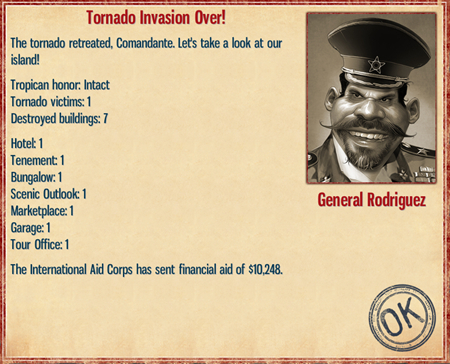
Everyone.
However, one central question remains: Having relaunched the greatness of Tropico with Tropico 3, how do you improve on it? The short answer is: add nukes.
The longer answer is a bit … longer. Numerous improvements have been made to the game. One new addition does allow the player to add a nuclear testing facility right in their back yard, but there is more than just that. Twenty new buildings have been created in Tropico 4, but that’s just the start. Other changes include some buildings not being immediately available to be unlocked. “Blueprints” now need to be purchased for some buildings, and just because your island has the cash doesn’t mean you can buy them – certain actions within the game can affect both the ability to unlock the blueprint as well as its cost. In sum there are many changes and improvements but they are so well-woven into the fabric of the game that it almost seems as though little has changed. This is likely to be the central question to long-time fans of the franchise – are there enough changes to the game to make Tropico 4 a sequel, or will gamers think of it more as an expansion?

The improvements are more than cosmetic – many will significantly contribute to the game. The process is still the same: save money to buy/improve your infrastructure to make more money and please one of your political factions. The difference between Tropico 3 and Tropico 4 is the new tools available to the player. Some of them are pretty cool. A Luxury Liner allows the player to lure higher paying tourists to the island. A nuclear power plant allows for substantially more electricity to be generated, but the catch is that fuel may only be imported from the USSR, so relations with them should not be neglected. Other new buildings include a stock exchange, shopping mall, art museum, customs office, blimp ride (Every dictator needs a zeppelin!) … the list is long.
Natural disasters have been updated, ranging from tornadoes to tsunami, which destroy infrastructure. Fires caused by an erupting volcano can burn down buildings – making the new fire station building rather handy. Buildings lost to fire can be rebuilt, but it’s like starting over – players must pay the full cost to rebuild. Some disasters can now prompt the intervention of the player. In one game a heat wave struck and I was given a choice: to ration water and help preserve my agricultural industry but lower the people’s happiness across the board, or allow them to consume water normally but face losing farms. There are no good answers in that situation – the player has to weigh the costs and benefits against his own play style, where he is in the game, and how well he thinks he can survive losing either popularity, food, or export crops.

A heat wave roasts my tiny island. The graphical depiction is actually very well done.
Not all disasters are natural – an oil spill can happen off the shore, prompting the player to either let it pollute (but saving money at the cost of alienating the environmental faction on the island) or cleaning it up. Clearly Haemimont has been reading the newspapers and deriving inspiration from the headlines, and Tropico 4’s disasters bring a freshness (as in fresh disasters!) to the game that makes it feel surprising contemporary despite the Cold War setting. I have to admit, however, that the four-month-long tornado that appeared over my island, while appropriately terrifying, probably lasted longer than it needed to. I couldn’t argue with the amount of destruction it caused, but it may have lingered a couple months longer than I would have expected it to do so in real life.
The campaign walks players through a different set of challenges – some islands are more conducive to tourism and have few natural resources other than beauty. Other islands are rich in agricultural or mineral wealth to be exported to the world.
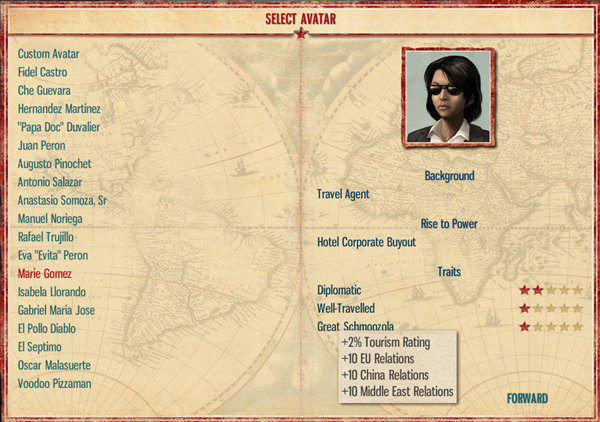
Players can choose from a variety of leaders (many historically accurate), each with different strengths and weaknesses of character.
In addition, ministers can now be appointed to assist with various tasks of running your government. Each of these ministers can have three attributes: intelligence, leadership, and courage. Not all attributes are necessary – courageous education ministers are superfluous, but one with low intelligence will negatively affect the rates of graduation in your high school.
The traditional bi-polar Cold War world often starts the game in the 1950s, but in addition to the US and USSR, players also have new secondary factions to complicate foreign affairs: the Middle East, Europe, and China. Though only the US and USSR will threaten to invade your island if relations with them grow too cold, there are benefits associated with befriending the secondary powers. They can be safely ignored if desired, but the wise player will try to find way to accommodate relations with them in order to benefit financially. Good relations with China, for instance, will yield cheaper luxury goods that can be sold to tourists and citizens. Poor relations with Europe will result in higher costs for hiring foreign experts. Neglecting the other powers won’t end the game, but strong relations with them can make things more comfortable.
Of course, the traditional fun of lining your Swiss bank account with embezzled funds is a part of Tropico 4, but players will also sometimes be challenged by other tropical island rulers to accomplish a task. Peers that are clearly caricatures of real-life personalities will sometimes appear and offer a friendly wager to build some kind of structure. Balancing against this is a limit of five active tasks that can be undertaken at any one time. So it might be tempting to take up Fidel’s offer of building a roller coaster for him to ride, but turning him down may keep a slot open for a greater reward that might (or might not) appear in the near future. Other than the cost of creating the structure there is little downside to having it and most challenges can be subtle hints encouraging action that will improve the player’s chance of winning.
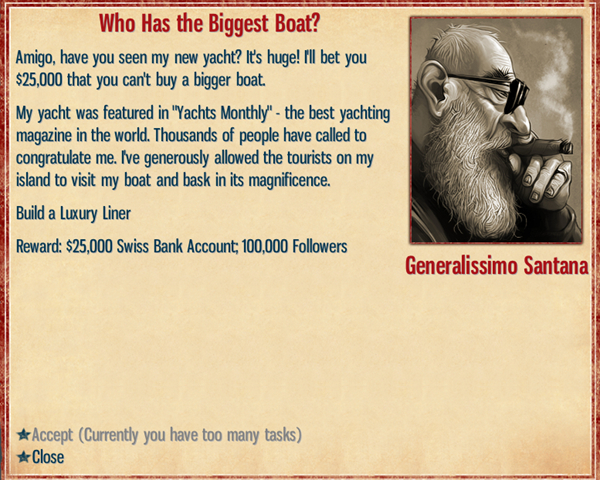
This friendly challenge is pricey but has a nice payoff. Unfortunately, as can been seen, I have accepted too many tasks to be eligible to accept another.
Another interesting development is the integration of social media with the PC version of the game. Players can export their accomplishments to both Facebook at Twitter for bragging rights. Unfortunately, this is as close to a multiplayer feature the game has to offer.
Gamers who enjoyed the previous titles in the series will find new twists and additional depth in Tropico 4. The question remains: is there enough new stuff to lure Tropico 3 players into Tropico 4? That’s tough to say. I love playing the Tropico series. The additions and changes are so well implemented that the game largely feels the same. For someone like me who loves the game and has little trouble mastering the the balance of economics and politics, I love it but I don’t feel like I’ve really been stretched. Playing Tropico is what I do when I want to unwind, hear some great salsa, and know that I’m going to be retiring in Switzerland at the end of the game. Despite the new additions, in many ways Tropico 4 feels like a recreation of a masterpiece rather than a new masterpiece. Nevertheless, the new additions are fun. An amusement park, balloon rides, cabinet ministers – the mix of additions gives players new toys.
Although the new additions seem more like tweaks than major changes Haemimont has made a smart choice. Tropico’s charm is a well-defined formula of managing economics and politics. Departing too far from this path – as Tropico 2 did – can result in upsetting the banana cart of a great game. Personally, I love the trip to the tropics that Tropico 4 provides, and if it feels very similar to Tropico 3, so what? People often take vacations to the same islands not for the new scenery but because they know exactly what kind of paradise they’re headed to. And that is exactly how I feel about Tropico 4. I love how the game is developing, and for me the charm is in knowing that there may be some new staff at the hotel and new items on the menu, but the sun will still be warm, the ocean blue, and beaches friendly. Tropico 4 is great and I can’t wait to take my next vacation on Tropico 5! But just one request – give us more music!
Summary: Tropico 4 takes all the greatness of Tropico 3 and stacks a banana boat of more fun on top of it. Players who have never experienced the island joys of tossing political rivals behind bars, calling for early elections, or going on a military spending spree in order to quash a burgeoning rebellion need to take a swing at this piñata. Tropico 4 brings the charm of a banana republic into the coziness of your computer. It’s a Cold War dictatorship served with hot mango salsa and an icy mojito. The islands never looked so good.
Armchair General Rating: 92%
About the Author
Jim Zabek grew up harvesting sugar cane on the island of Tropico. After graduating from the Hugo Chavez school of performing arts (majoring in dance) he went on to work as a tour guide giving zeppelin rides over the island. After a brief mix-up as to the ownership of the local radio station he began broadcasting messages that the previous dictator of Tropico had spontaneously decided to go on permanent vacation to Switzerland. Seeing that the residence at the governor’s palace was empty he occupied it on behalf of the Tropican people. These days he enjoys sipping piña coladas while getting caught in the Tropico rain. When he’s not giving speeches to his adoring public he can sometimes be found in the library of the palacio where he plays computer games and dreams of starting his own mariachi band.
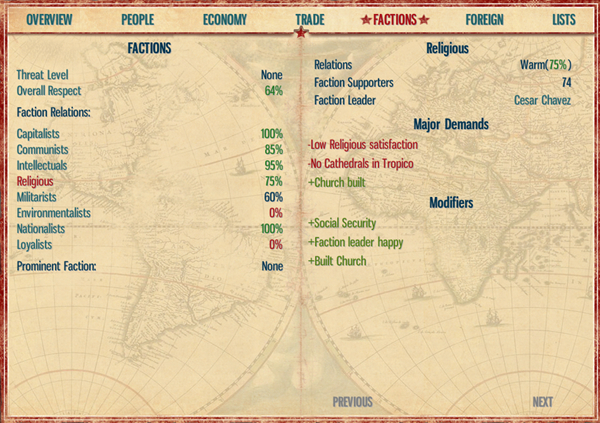
You can’t please everyone, but if you please enough you’ll find success.


i can make manual money cheat by using cheat engine …hahaha